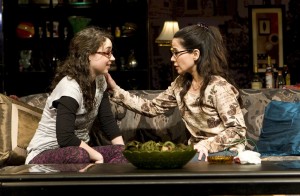Familial Tribulations with a Russian Twist
The New Group, a dynamic organization dedicated to developing new playwrights, has a 15 year history of producing works about the trials and tribulations inherent in families, but this is arguably the first one with a Russian twist. Russian Transport, written by talented newcomer, Erika Sheffer, focuses on immigrant parents with two dysfunctional Americanized children. What happens when mom’s sexy and mysterious brother comes to visit from Russia is at the center of the action, leaving each character’s fate hanging in the balance.
The play is set in a modest home in Sheepshead Bay, Brooklyn, where Diana and Misha are raising Mira, a teenager in high school who is determined to see the world, and her older brother, Alex, who longs to own it. Diana and Misha run a failing limousine business and are always in debt, scraping by with secondhand Timberland boots and discount cell phones from Alex’s job at Verizon. No one is happy.
Life is a dull ache until Boris, Diana’s little brother, enters big and fresh from Russia, complete with a swagger and a leather jacket. His privileged position in the house is made clear as the awkward but curious Mira is forced by mom to vacate her room for him, banished to the air mattress downstairs. Alex looks wide-eyed at the strong male presence, so much in contrast to his quiet, dowdy father. It isn’t clear what Boris did in Russia, but he does have a gun and prison tattoos. He quickly procures a bartending job (or so he says) and starts cultivating the children to his own ends. Mira is infatuated with his uber-male physicality and worldliness; Alex is seduced by the prospect of money, which Boris seems to have way past a bartender’s income. Only Misha seems less than enamored with his brother-in law, and it emerges, little by little, that they have a less than pleasant shared history.
And Misha has reason to worry. Boris, as it turns out, is importing girls from Eastern Europe as sex slaves and having Alex pick them up (under false pretenses) at the airport for delivery; he draws the innocent Mira into his web and then proceeds to treat her less than appropriately. The already tenuous family ties begin to unravel in a battle between good and evil where everyone has to choose a side. Who chooses what side is the surprise in the play’s final scenes.
This production will get a lot of attention because of Janeane Garofalo, the well-known movie actress and comedienne, in her first theater effort and her latest in a string of dramatic ensemble pieces (there was recently a short-lived TV spinoff with Forrest Whitaker). As Diana, the mother of this motley brood, she is all activity and wisecracks, wanting to keep her kids close and let them fly simultaneously, succeeding ultimately in neither option. Garofalo is, however, the least believable of the group. Although she has a fabulous Russian accent, and delivers comedy as it should be delivered, she seems too young for the part and not as engaged as the other actors. Her identity flattens against the three-pronged drama of Boris and Alex and Mira – and in the end, her power is completely deflated by Misha’s confessions about his own moment of truth back in Russia. While her stance in one of the final scenes may surprise some, her delivery does not quite do justice to its gravity.
Kudos, however, to the rest of the cast, and if Garofalo brings audiences to see them, she has done everyone a favor. Morgan Spector as Boris takes over the stage every time he’s on it, a cunning, charismatic presence that goes beyond his estimable physique. The kids are terrific. Sarah Steele evokes true exasperation, then sympathy, as an expertly annoying but ultimately self-knowing teenager. Raviv Ullman evolves tragically from a bratty big mouth to a sober adult with firsthand experience of true evil. As Misha, the forlorn patriarch sitting behind the wheel of a limo day after day, but who hides a terrible secret, Daniel Oreskes becomes more and more human — and dignified — as the action plays out, and the source of his sadness and feelings of powerlessness are the play’s most poignant revelation.
This is a very impressive writing debut for the playwright, Erika Sheffer. Although her grasp of dialogue and action is stronger than her understanding of character, she takes breathtaking, successful chances with interactions – especially between Boris and Mira – that a more established playwright might avoid for their lack of subtlety. The play is expertly directed by veteran Scott Elliott and the set is a perfect reflection of the disjointed nature and claustrophobia of the characters’ home life. For an evening of thought-provoking theater, steeped in current events but taking on far larger issues, Russian Transport stands strong among what’s on Broadway right now and is more than worth the price of admission.
“Russian Transport” is currently playing at The Acorn Theatre and can be viewed through March 10. For more information and ticket sales, please visit www.thenewgroup.org.


